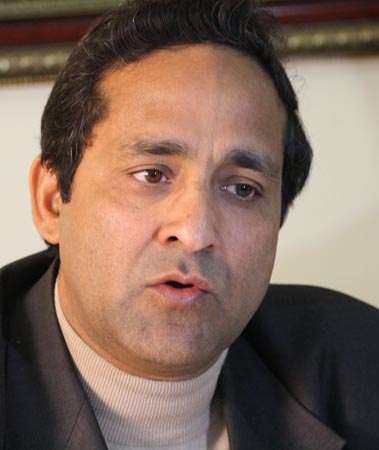For years people knew Shakeel Qalander as an entrepreneur. This year, his hunt to understand the basics of J&K government’s relationship with NHPC brought shocking facts to the fore. These revelations have exposed the shady dealing of successive regimes, a report by R S Gull.

It was 1982, remembers Shakeel Qalander, when he completed his post graduation in commerce and joined his father’s modest furniture business. And that was it. He created a brand out of the business, built it brick by brick anddiversified it into EssQue group of industries currently employing around 200 skilled and educated persons.
“I re-organized the business, put more emphasis on quality and delivery and re-priced the product and things started moving in right direction,” said Shakeel in a free wheeling interaction. “I would ensure the designs change half yearly and that attracted the customer.”
In last three decades, the group has grown in such a way thatfurniture is barely 10 percent of the overall yearly turnover. Qalander got into interior designing, setting up pre-fabricated dwellings and now has moved into highly specialized process like acoustics in which sound proofing and thermal insulations are attended to. His group did most of the interior woodwork in SKIMS, SKICC and the High Court.
“I always had the passion of reviving the Khatamband and Pinjrakari and I did my best to ensure it is revived,” he said. “We always had artisans but they lacked a voice, advocacy and salesmanship and I tried my best to roll all these requirements into one and do it.” Now the group is working to get into the painted ceilings.
Success and knowledge helped Qalander get into the industrial leadership. As president of the Federation of Chambers of Industries (FCIK) for over five and a half years, he was one of the major advocates of the small manufacturing base in Kashmir. At one point of time, he and Kashmir Chamber of Commerce and Industries (KCCI) former leader Dr Mubin Shah, were the most active trade leaders of Kashmir who put in their best for their respective organizations. Anyone of cosequence flying into Srinagar would rarely take off without meeting them. Their differences on issues notwithstanding, their joint success was to get the trade a stake-holding in the overall happenings, on both sides of the ideological divide.
The mobilization of the manufacturers goes to Qalander’s credit. Perhaps for the first time, a band-saw owner and a water mill runner were recognized as manufacturers and organized to a level that they had some say in the overall decision making. It helped him grow at personal level and become member of the Prime Minister’s task force on MSME and later to the Dr C Rangarajan committee on jobs. This came after he triggered an embarrassment for the government by returning the industrial package of incentives to the Prime Minister in Jammu saying it created inequalities in opportunities. For most of his presidency in FCIK he would campaign for import substitution.
Post FCIK, however, it was his initiative of getting to the core of relationship between the state government and the NHPC that kept him in news. “I was reliably told that the agreements that state government had signed with NHPC were something different than what the people in power claim so I started hunting the basics,” said Qalander. He cobbled together a rag-tag civil society group that went to the court and later took the RTI route to the documents.
Once it came out, it was shocking. “There is no agreement between the state government and the NHPC on Salal, Uri-1 and Dul Hasti and they are operating illegally,” said Qalander. The initial understanding was that state government would get sixty percent of the generation from Salal and later it was reduced to fifty-fifty but the system in vogue is that we are getting barely 12% as royalty which is not explained by anybody in the central government, NHPC or the state government.
“We have not decided to go to the court yet but we have written to the state government that the documents collected through all these sources prove beyond a point that NHPC is operating all the three projects – Salal, Dul Hasti and Uri, illegally and unconstitutionally,” Qalander said. “The onus lies on the government to reclaim the property.” The three operational projects contribute nearly half of the overall NHPC generation annually.
The Indus Water Treaty and the state’s inability to harvest its vast water resources have remained fundamental to the civil society debate in Kashmir. But Qalander says he was not attracted by the glamour of the debate but the essence of it for the society. “Energy deficit is key to [understanding] our overall backwardness and every sector suffers because of it,” he said, “So it should be the priority.”
Surprised that the Irrigation Minister is keeping quiet over NHPC’s failure in seeking registration of their projects under the new law that set up State Water Resources Regulatory Authority, Qalander says the state government must act to prove its credibility. “If there was a deadline for submitting the papers and it is over in November, what is state government waiting for?” he asked. Interestingly, J&K government has opted for loud thinking on buying back two NHPC projects. “You make a purchase when somebody owns something but NHPC can not prove its ownership so how you can purchase it,” saidQalander, adding, “The best recourse is to take these projects over.”
Qalander’s battle might not yield results but his intervention has helped the society to understand the dynamics of “relationships” in J&K. It definitely makes the society wiser and policy makers nervous.















